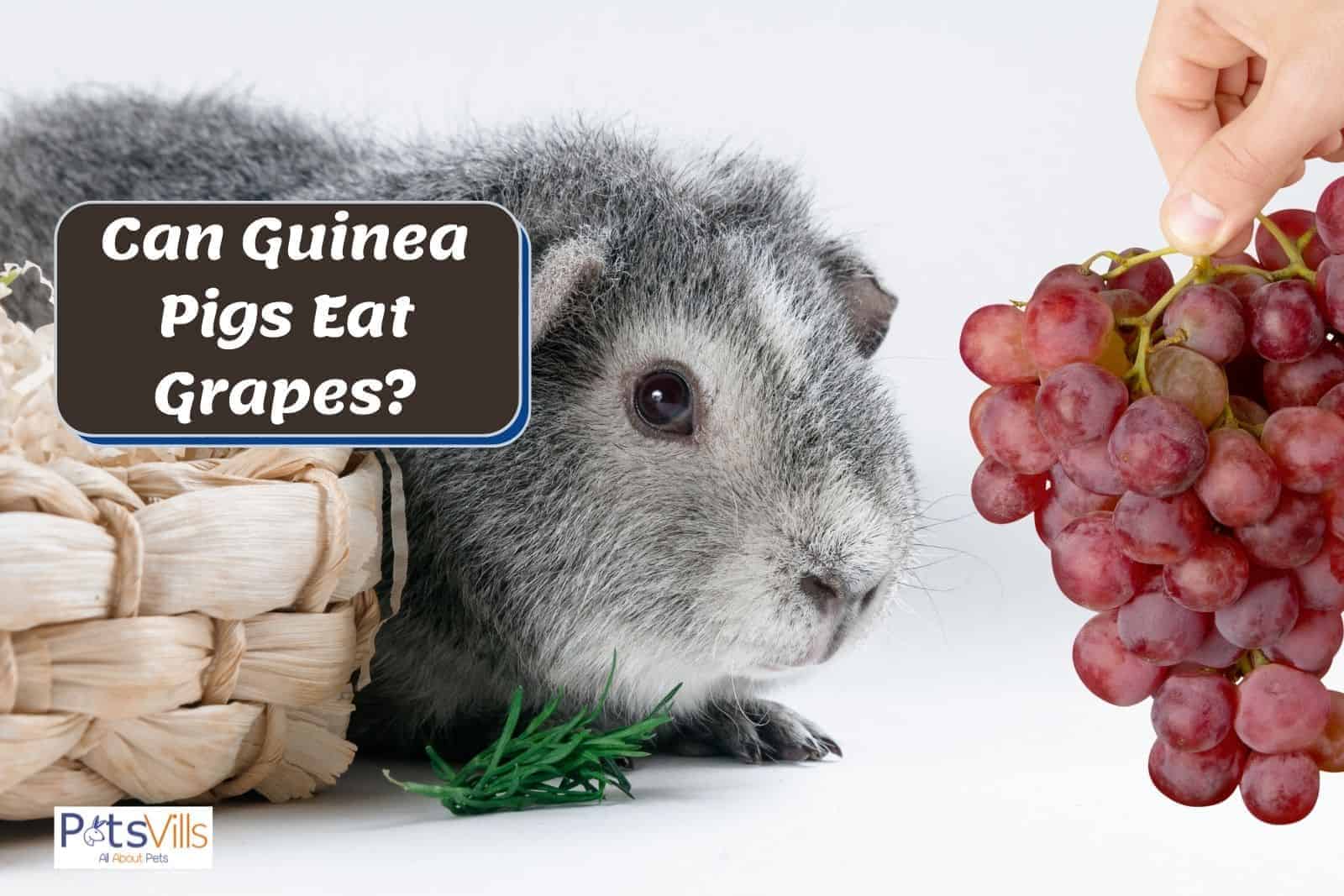Can guinea pigs eat grapes?
Are you trying to add some variety to your guinea pig’s diet and researching which sweet juicy fruits make the best tasty treat?
You’re not alone; we often get asked if guinea pigs can eat strawberries or can guinea pigs eat blueberries too.
So can guinea pigs eat fruit like grapes?
Keep reading for the definitive pet owner’s guide to safely feeding your guinea pig fresh grapes.
Table of Contents
Can Guinea Pigs Eat Grapes?
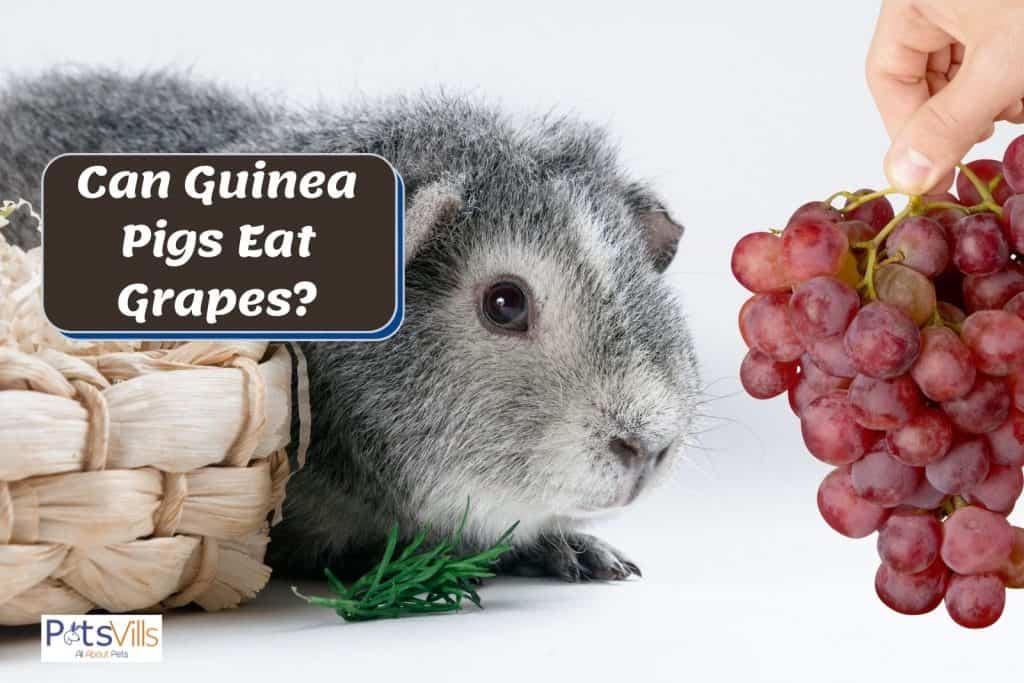
Yes, it’s safe to feed your guinea pig grapes. Red, green, or any color in between, they’re all fine as an occasional special treat for your cavy.
You read it right; these small, sweet treats are not toxic to guinea pigs. That’s kind of surprising given they are toxic to dogs and can cause problems in cats.
If you stop reading now, the key thing to take from this article is that you should not regularly give grapes to your guinea pig. They’re an occasional treat.
Why? I’ll go into more detail soon…
For now, it’s enough to know that some of the nutrients found in this fruit can cause your cavy problems when consumed in large quantities.
Check out this video:
How Often Can You Give Grapes to a Guinea Pig?
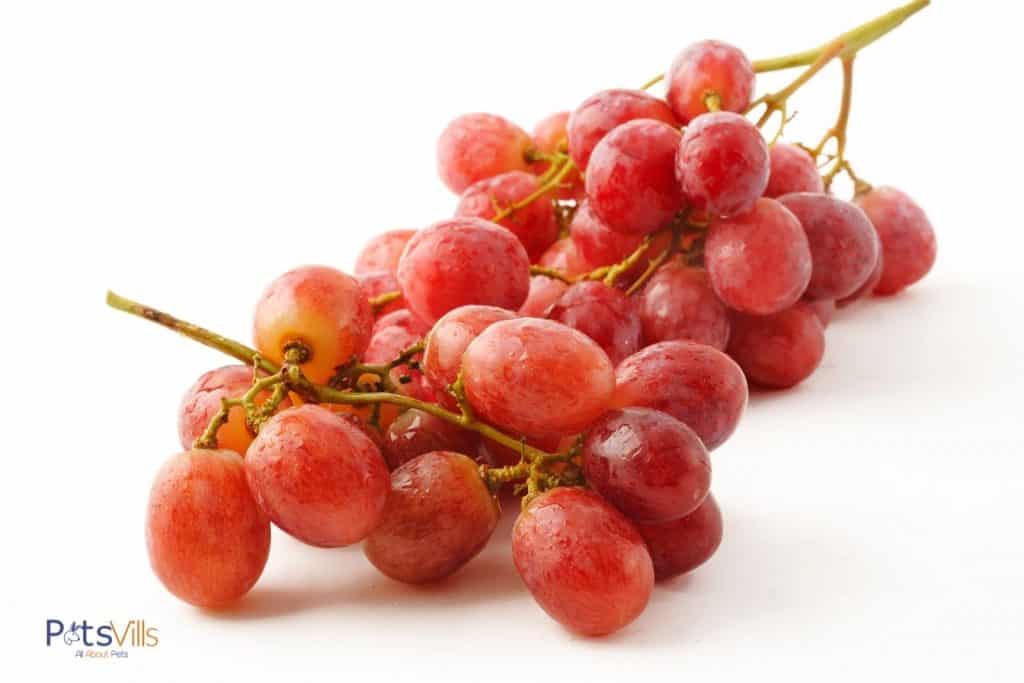
Veterinary Dr. Edele Grey recommends giving your guinea pig one or two grapes no more than two times a week.
They are essentially balls of juicy, sugary flesh that will satisfy your cavy’s sweet tooth. But, just like kids and candy, too much is bad for them. And for most of the same reasons.
Can Guinea Pigs Eat Grape Seeds?

It’s not a great idea to give your pet grapes with seeds. Grape seed is a potential choking hazard so remove them before serving.
Ideally, buy seedless grapes for your guinea pig. However, you still need to check for and remove seeds as a small amount are sometimes present in seedless varieties.
Can Guinea Pigs Eat Grape Stems?
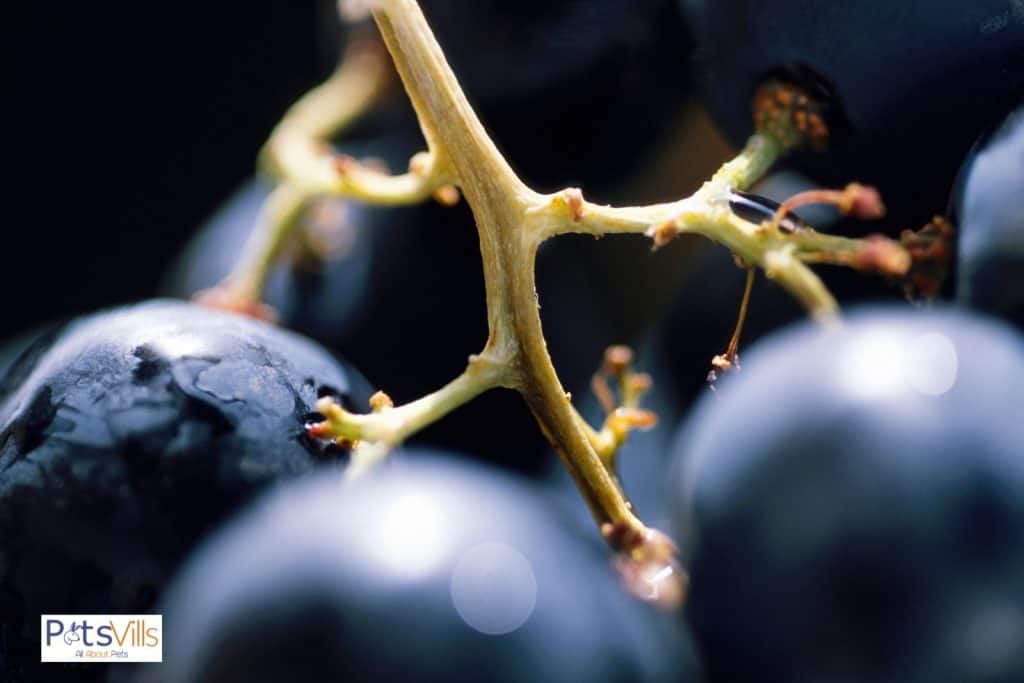
Your cavy can safely eat the occasional grape stem. It won’t do them any harm and adds a little extra roughage into their natural diet.
Chewing the stems will also help to keep your guinea pig’s teeth healthy, clean, and worn down to the correct length.
Guinea Pig Nutrition
Seeing as we’re about to take a deep dive into the nutritional values of regular grapes, it makes sense to learn a little bit about your furry friend’s dietary requirements.
Then we’ll take a look at the nutritional value of a single grape to see exactly what you’re putting into your pet’s system and the linked health benefits.
What do Guinea Pigs Eat
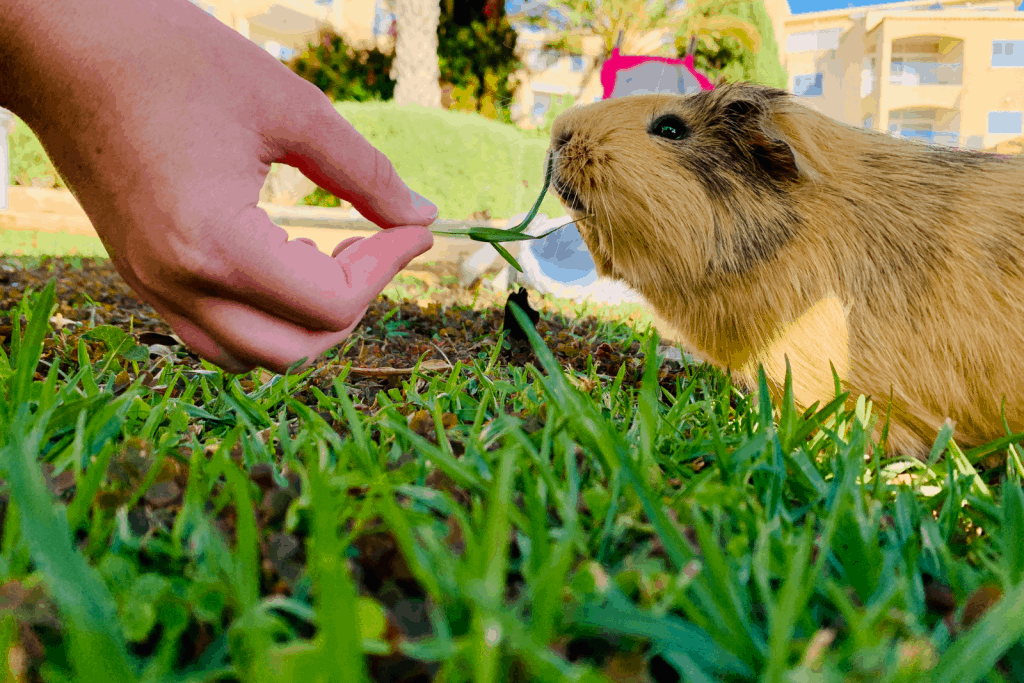
Cavies are herbivores. That means they only eat plant-based foods. They need a diet that is high in fiber, low in carbohydrates, and low in fat.
Guinea pigs also need to get all of their daily vitamin C from their food as, just like you and me, they are unable to produce it in their bodies.
NC State Veterinary Hospital recommend the following breakdown of food sources for a balanced guinea pig diet:
- 80% Hay – The bulk of any cavy’s balanced diet should be grass hay. Timothy and orchard hay are the most common types available in pet shops.
- 10 % Pellets – Guinea pig food pellets are a sure-fire way of getting additional nutrients into your guinea pig. The content can vary, so check with your vet or pet food supplier about the best one for your furry friend.
- 10% Leafy Greens – Fresh vegetables add some variety to your guinea pig’s food bowl and can be a great source of vitamin C, which is very important.
It’s highly important that your cavy gets the required amount of vitamin C. This should come from the above food sources and a commercial guinea pig vitamin C supplement, if necessary. Consult your vet or pet food store for more details.
You’ll have noticed that fresh fruit doesn’t feature on that list. Further reinforcing the point that grapes are just a special treat! Your cavy doesn’t need or rely on them for their nutrition.
Grape Nutritional Values
Nutrients found in a single grape (7 g)
| Water | 5.64 g |
| Energy | 4.83 kcal |
| Protein | 0.05 g |
| Fat | 0.011 g |
| Carbs | 1.27 g |
| Fiber | 0.063 g |
| Sugars | 1.08 g |
| Calcium | 0.7 mg |
| Iron | 0.025 mg |
| Magnesium | 0.49 mg |
| Phosphorus | 1.4 mg |
| Vitamin C | 0.224 mg |
| Vitamin B-6 | 0.006 mg |
| Vitamin A | 0.21 µg |
| Vitamin D | 0 µg |
| Vitamin K | 1.02 µg |
Check the video of these cute guinea pigs eating grapes:
Pros of Feeding Guinea Pigs Grapes
Vitamin C
As we touched on earlier, guinea pigs aren’t able to produce vitamin C in their bodies as some animals do. This means they need to get all of their daily vitamin C from their food.
They aren’t the only aminals with this dietary quirk; monkeys, bats, and even humans are also unable to produce essential vitamin C. You have more in common with your guinea pig than you knew!
There is 0.224mg of vitamin C in a single piece of fruit, so sure, grapes will give a slight boost to a cavy’s vitamin C intake, but they are no replacement for the staple sources in their diet.
What are those sources? Pellets, vitamin C supplements, and leafy green vegetables like romaine lettuce.
Cavies that don’t get enough vitamin C can suffer from a condition called scurvy, a disease famous for affecting pirates and sailors, scurvy causes skin and joint problems for cavies, as well as interfering with the blood clotting process.
Vitamin B-6
Vitamin B-6 plays a role in many essential body functions. These include the development of the brain and maintenance of the nervous and immune systems. Some real health benefits!
Fiber
Guinea pigs need to have food constantly moving through their digestive system to minimize health problems.
The fiber in their diet helps to clear loose particles from the digestive tract.
A serving of grapes no substitute for hay, but every little bit of fiber helps!
The Dangers of Giving Guinea Pigs Grapes
Sugar Content
One of the main nutrients limiting the serving size of most fruit is sugar. Our nutrition chart shows that in a 7 g grape, there is 1 g of sugar. That’s a lot for a guinea pig!
So what is the problem with sugar?
It can upset the balance of good and bad bacteria in your guinea pig’s gut, resulting in diarrhea, stomach upset, and other digestive problems.
Excess sugar can also cause diabetes in cavies and contribute to obesity, which comes with many associated health problems and disease risks.
The good news is that veterinary treatment can reverse these issues with the help of a healthy diet.
Calcium and Oxalates
Calcium and oxalates (oxalic acids) contribute to the formation of kidney stones, a prevalent problem seen in guinea pigs.
Oxalates bind to the calcium, making it impossible for a cavy to absorb. They may be taking in enough calcium, but the cavy will experience a vitamin C deficiency if the oxalates render it useless.
Red and green grapes have a low oxalate content, so this is not a real problem, given you’ll only be serving up one or two infrequently.
Red and green are the most common types of grapes. But, there are others.
Concord grapes are a relative of the regular variety of grape, commonly used in jelly and other concentrated products.
They are high in oxalates, so you should not give these to your cavy.
Pesticides
As with all fresh fruit and vegetables, grapes are sometimes grown under conditions where they are exposed to pesticides and fertilizers.
These can be harmful or even toxic for your guinea pig, so you need to remove any traces that may remain.
Rinsing the fruit under fresh water will help remove any nasties while peeling them reduces the risk further.
Grape Seeds
As I mentioned earlier, types of grapes with seeds should have the seeds removed from the fruit before serving to your guinea pig.
They could be a choking hazard for your cavy; it’s not worth taking the risk.
Even seedless varieties can have some seeds in, so always double-check before giving grapes to guinea pigs.
How to Prepare Grapes for Your Guinea Pig
- Buy seedless organic grapes for your cavy. This reduces the chance of finding seeds inside and, in theory, means that this type of grapes has not been exposed to chemicals.
- Rinse the grapes under fresh water. Even if you have bought organic, there can still be traces of dirt or other unwanted debris on the fruit’s skin.
- Chop them up. Slice each grape in two before you serve it to your cavy. This makes them more manageable and also gives the opportunity to check for seeds. If you’re going to peel off the grape skin, now is the time to do it. The skin contains a lot of the fruit’s fiber so consider the risk/reward balance before doing so.
- Enjoy watching your guinea pig investigate their treat. Not all piggies like grapes, so you’ll want to see what yours make of them. Don’t forget to remove any uneaten food as it will quickly spoil.
Can Guinea Pigs Eat Grapes FAQs
Can Guinea Pigs Eat Grape Stems?
Yes, you can leave the stem on the grape when you give it to your guinea pig. It won’t do them any harm and adds a little extra roughage to their diet. Gnawing the stalks also helps to keep their teeth in good shape.
Will Grapes Help Guinea Pigs With Vitamin C Deficiency?
You should only be giving your guinea pig one or two grapes twice a week at most. The amount of vitamin C in this portion will not make a significant difference to animals deficient in vitamin C. Speak to your vet for advice on the best type of food to help.
Can Guinea Pigs Eat Raisins?
Raisins are dried-out grapes; nothing changes that would make them toxic for guinea pigs. That said, you should avoid giving raisins to your cavy due to the very high sugar content.
Final Thoughts
Can guinea pigs eat grapes? That’s the topic I set out to cover in this article.
If you read from top to bottom, you’ll have learned that both red and green grapes are safe for guinea pigs in small quantities.
Vets recommend feeding no more than one or two grapes up to two times per week. Any more increases the risk of various health problems.
These include diarrhea, diabetes, obesity, and kidney stones.
Eaten in such small quantities, the potential health benefits of grape consumption don’t really factor into the equation.
That leaves them firmly in the category of a sweet treat, something your cavy can occasionally enjoy in moderation.
By taking the time to do some research into guinea pig safe foods and treats, you’ve demonstrated that you are a responsible owner.
If you still have any questions or doubts, speak to your vet for bespoke advice that is specific to your pet.
Thanks for reading!
References
- Hughes, E 2020, Can Guinea Pigs Eat Grapes?, Feeding My Pet, viewed 26 June 2021, <https://www.feedingmypet.com/can-guinea-pigs-eat-grapes/>.
- People Foods to Avoid Feeding Your Pets n.d., ASPCA, viewed 26 June 2021, <https://www.aspca.org/pet-care/animal-poison-control/people-foods-avoid-feeding-your-pets>.
- Caring For Your Pet Guinea Pig 2016, NC State Veterinary Hospital, viewed 26 June 2021 <https://cvm.ncsu.edu/wp-content/uploads/2016/12/Caring-for-your-Guinea-Pig.pdf>.
- Grapes, raw 2020, U.S. Department of Agriculture, viewed 26 June 2021, <https://fdc.nal.usda.gov/fdc-app.html#/food-details/1102665/nutrients>.
- Vitamin C Deficiency in Guinea Pigs 2016, Pet MD, viewed 26 June 2021, <https://www.petmd.com/exotic/conditions/cardiovascular/c_ex_gp_vitamin_c_deficiency>.
- Vitamin B-6 2021, Mayo Clinic, viewed 26 June 2021, <https://www.mayoclinic.org/drugs-supplements-vitamin-b6/art-20363468>.
- Guinea Pigs with Diabetes n.d., Guinea Lynx, viewed 26 June 2021, <https://www.guinealynx.info/patriciasimon_diabetes.html>.
- O’Connor, H (RD) 2015, The Oxalate Content of Food, Dr. Cheryl Kasdorf, ND, viewed 26 June 2021, <https://drcherylkasdorf.com/wp-content/uploads/2015/02/OxalateContent092003.pdf>.
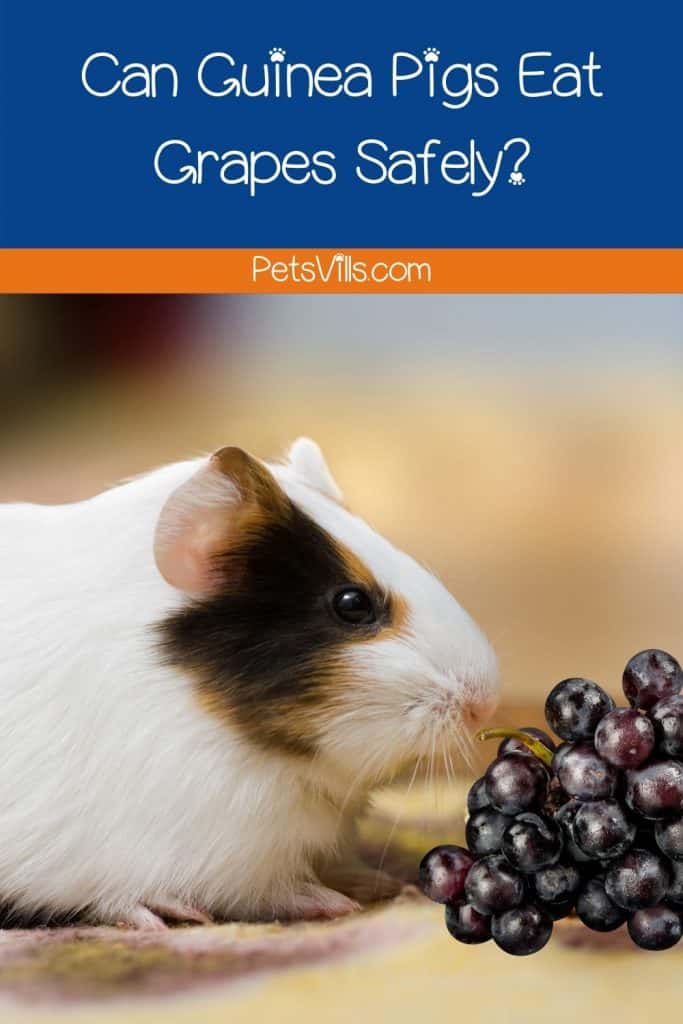
Can guinea pigs eat grapes? Let us know your thoughts in the comments below!
Barry Stingmore is a British content writer living in Fuerteventura, Spain. An animal lover at heart, he shares his home with a dog and four rescue cats and has a passion for writing about animals big and small.
Barry loves finding answers to your animal-related questions, the more research involved the better! You can rely on him to find the facts.
Find him on FACEBOOK, TWITTER AND Linkedin
Read his latest ARTICLES.
Find more about him HERE.

